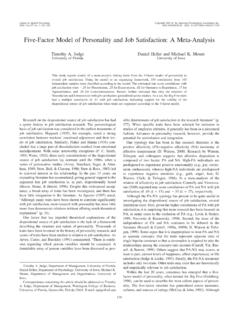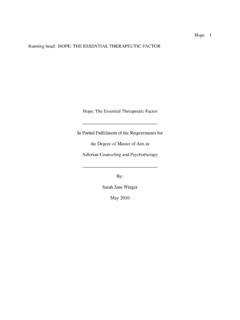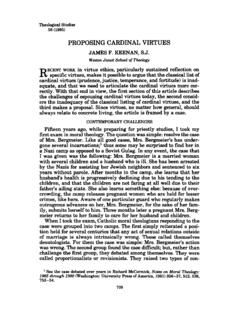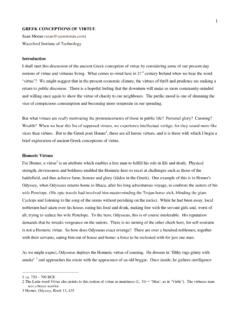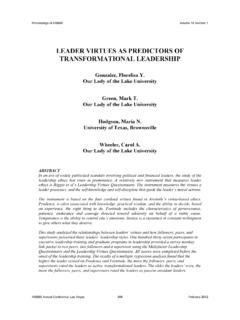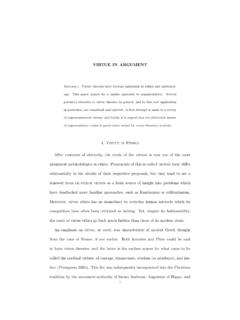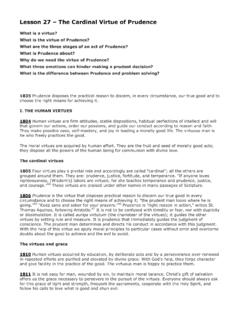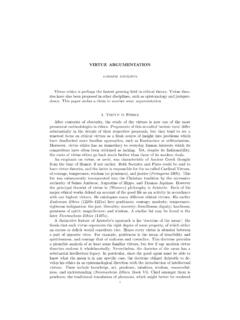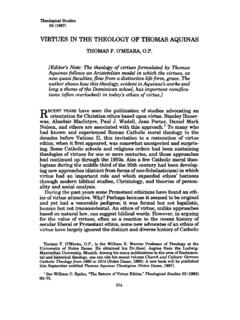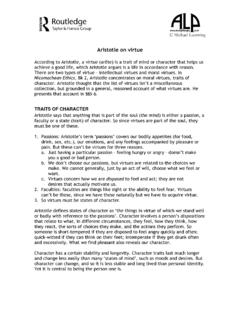Transcription of Aquinas and the Ethics of Virtue - University of South Florida
1 1 Aquinas and the Ethics of VirtueThomas WilliamsNote: This is a preprint of my introduction to the forthcoming translation by MargaretAtkins of thomas Aquinas s Disputed Questions on the virtues (Cambridge Texts inthe History of Philosophy).The basic procedure was simple. The topic would be announced in advance so that everyonecould prepare an arsenal of clever arguments. When the faculty and students had gathered,the professor would offer a brief introduction and state his thesis. All morning long anappointed graduate student would take objections from the audience and defend theprofessor s thesis against those objections. (And if the graduate student began to flounder, theprofessor was allowed to help him out.) A secretary would take shorthand notes. The nextday the group would reassemble.
2 This time it would be the professor s job to summarise thearguments on both sides and give his own response to the question at issue. The whole thingwould be written up, either in a rough-and-tumble version deriving from the secretary s notesor in a more carefully crafted and edited version prepared by the professor himself. Records ofsuch academic exercises have come down to us under the title disputed questions .The present text offers translations of some disputed questions on ethical topicspresided over by thomas Aquinas (1224/6-1274), probably during the period of 1271-72, whenhe was for the second time the Dominican regent master in theology at the University of Paris. They examine the nature of virtues in general; the fundamental or cardinal virtues of2practical wisdom, justice, courage, and temperateness; the divinely bestowed virtues of hopeand charity; and the practical question of how, when, and why one should rebuke a brother for wrongdoing.
3 Whether these were formal public disputations of the sort I have described,or a more low-key version adapted for use in Aquinas s own classroom, is not altogether clear. What is certainly undeniable is that they show Aquinas using the disputed-question formatwith characteristic brilliance, as we can see by contrasting the Disputed Questions on the Virtueswith discussions of the same topics in the second part of the Summa theologiae, which datesfrom roughly the same period of Aquinas s career. The articles of the Summa theologiae follow atruncated disputed-question format, suited perhaps to the beginners for whom he intendedthat great work. They typically include three opposing arguments for each thesis, andAquinas s determinations (the My reply or I answer that sections) are ordinarily acouple of paragraphs.
4 In the Disputed Questions on the virtues the determinations run muchlonger, and there are (on average) fifteen or sixteen opposing arguments. This more expansivetreatment, though initially somewhat challenging for the present-day reader, allows Aquinas tooffer more supporting examples, tease out more nuances, draw more helpful distinctions, andguard against a wider variety of possible misunderstandings than in the Disputed Questions focus on Virtue . But is a close look at Aquinas s account ofvirtue really the best way into his Ethics ? Many historians of philosophy see Aquinasprincipally as a defender of natural-law theory. Others regard his account of happiness, hisanalysis of human action, or his theory of practical reasoning as the cornerstone of his Ethics .
5 One need only look at some recent titles of books on Aquinas s Ethics to see the differing3emphases: The Recovery of Virtue , Aquinas s Theory of Natural Law, Aquinas on the Twofold HumanGood, Aquinas on Human Action, Right Practical Reason. Some scholars argue that their favoureddiscussion has at least expository priority: in other words, that in laying out Aquinas s ethicsone must talk about that area first, and only then can one understand other areas properly. Some go still further and argue for something stronger, which we might call logical priority:that their favoured area is the real heart of Aquinas s Ethics , and other areas are at best mereappendages and at worst regrettable excrescences. There has been a particular rivalry betweeninterpreters who focus on natural law theory and those who focus on the doctrine of an introduction to a set of questions on Virtue one might expect to find a defence ofthe centrality of Virtue in Aquinas s ethical thought.
6 But in fact I think it is a mistake todescribe his theory of Virtue as any more or less central than his accounts of happiness, thenatural law, practical reasoning, and responsible action. Aquinas s Ethics is so thoroughlysystematic that one cannot adequately understand any of these accounts without drawingheavily on all the others; to talk in anything like sufficient detail about any one of themrequires one to talk about all of them. Since the doctrines of natural law and Virtue have beenregarded as particularly remote from each other, I can best make my case for the systematicunity of Aquinas s moral theory, and illustrate the place of Virtue within it, by beginning fromthe theory of natural law and showing how it leads inevitably to the discussion of natural law to virtueA good place to start is with the first appearance of what will become a standing4analogy in the so-called Treatise on Law: the analogy between the functioning of speculativereason (the sort of thinking that aims simply at knowing the truth) and the functioning ofpractical reason (the sort of thinking that aims at making or doing something).
7 Aquinas writes:Now in speculative reason, what comes first is the definition, then the proposition, andthen the syllogism or argument. And since practical reason also makes use of asyllogism of sorts having to do with possible actions .. we need to find something inpractical reason that bears to actions the same relation that the proposition inspeculative reason bears to conclusions. Such universal propositions of practical reasonordered to actions have the character of law. (ST 1a2ae ad 2)We can think of Aquinas as setting forth an analogy with all the points of comparison filled inbut one:speculative reasonpractical reasonstarts frompropositions (aka first principles)?proceeds by way oftheoretical argument/syllogismpractical argument/syllogismuntil it reachesa conclusiona particular actHis proposal is that we give the name natural law to those universal principles in practicalreason that function in a way analogous to principles in speculative Aquinas does not think that anyone who engages in speculative reasoning isactually thinking about first principles in every single argument she makes; in fact, unless sheis a philosopher, she may well never think about first principles.
8 Nevertheless, those principlesare operative in her reasoning, even though they may not be actively before her mind. Whensomeone has a bit of knowledge in this way, Aquinas says that she has that knowledge dispositionally (habitualiter). The disposition of the speculative intellect in Virtue of which itIn fact, being indemonstrable is part of the definition of principle . Keep in mind that the Latin word for1 principle is principium, a beginning or starting-point. Principles are the starting-points of arguments, notconclusions of first principles is called intellectus. Since there are analogous principles the naturallaw operative in practical thinking, even if the thinker is not at the moment attending tothem (or indeed has never attended to them), we can expect that there is an analogousdisposition in the practical intellect.
9 That disposition is called synderesis. Synderesis is thedisposition containing the precepts of the natural law, which are the first principles of humanacts (1a2ae ad 2). Aquinas continues his development of the analogy by noting that in the speculativerealm there is one principle that is absolutely first: the principle of non-contradiction. In thepractical realm the analogous principle is that good is to be done and pursued, and evil is tobe avoided (1a2ae ). Both first principles are indemonstrable: that is, they cannot beproved. But they are not the only indemonstrable principles in their respective realms. Principles in the speculative realm are all indemonstrable; even though some of them are ofless generality than others, they do not depend on others in the sense of being deducible fromthem.
10 For example, the principle that the whole is greater than the (proper) part is in asense that turns out to be very difficult to pin down of less generality than the law of non-contradiction, but it cannot be deduced from the law of non-contradiction. We find the samesort of relationship among principles in the practical realm. The most general principles arehierarchically ordered, but they are not deduced from the very first principle or from Note, then, that desire (appetitus) has a broader extension in Aquinas s philosophy than in our ordinary2usage of the term. We would not ordinarily speak of plants, for example, as having desires; but they dohave appetitus, since they have internal dynamisms by which they tend towards achieving theircharacteristic I have said, the first precept of the natural law is that good is to be done andpursued, and evil is to be avoided.
